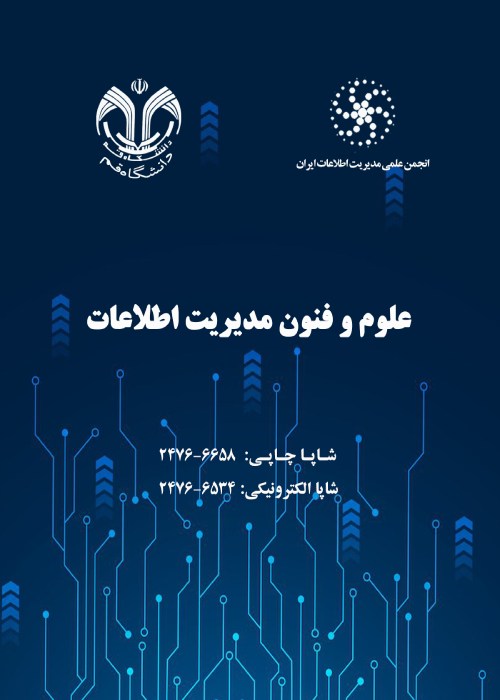The Consequences of Knowledge Inertia in Knowledge-Based Companies
Author(s):
Article Type:
Research/Original Article (دارای رتبه معتبر)
Abstract:
Purpose
Knowledge inertia is the tendency to rely on past procedures, knowledge, or experience to address new issues and problems. In other words, it considers the future as today. In fact, individuals and organizations rely on their previous knowledge and experience to navigate unprecedented and new conditions. Therefore, the present study was conducted to analyze the consequences of knowledge inertia in knowledge-based companies.Method
The current research utilizes a mixed methods approach, incorporating both qualitative and quantitative methods within the inductive-deductive paradigm. It is also practical in terms of its purpose and exploratory in terms of its nature and method. It is important to note that the statistical population for both the qualitative and quantitative parts of the research consists of experts, including managers of knowledge-based companies in Lorestan province and professors from the management department of Lorestan University. A purposeful sampling method was used to select 14 individuals as sample members. Therefore, according to the principle of theoretical sufficiency (which occurs when the researcher has gathered all available data and information necessary to understand the phenomenon and gain knowledge), the necessary data were collected to the fullest extent. It should be noted that in the qualitative aspect of the thematic analysis approach, apart from reviewing articles, books, and magazines, semi-structured interviews were also conducted. The validity and reliability of these interviews were assessed using the CVR coefficient and the Kappa-Cohen test, respectively. Confirmed. In the quantitative section, the data collection tool is the Delphi questionnaire. Its validity and reliability were confirmed using content validity and inconsistency rate, respectively.Findings
The current research utilizes a mixed approach (qualitative and quantitative). The results obtained in the qualitative part indicate the identification of the consequences of knowledge inertia in knowledge-based companies. The results of this section, following data analysis using the coding approach (open, central, and selective coding) and Atlas.ti software, reveal fifteen factors as consequences of knowledge inertia in knowledge-seeking companies. In the quantitative aspect of the research, the fuzzy Delphi method was employed to prioritize the consequences of knowledge inertia in scientific companies. The results indicate that the disclosure of the organization's strategies, the enhancement of predictability in the organization's operations, and the increase in stagnation and intellectual inertia are significant outcomes. The most significant consequences of knowledge inertia in knowledge-based companies are the loss of creativity and innovation, resistance to change, reduced performance, diminished organizational learning, and decreased agility and flexibility.Conclusion
Knowledge is considered one of the most fundamental and crucial assets for competing in the new millennium. No matter how many resources an organization has, if it does not leverage modern knowledge and science, its resources will remain stagnant and it will be practically unable to use them optimally. Acquiring knowledge and leveraging it can enhance the organization's growth and excellence, ultimately improving its competitive position. In other words, knowledge determines the efficient and effective utilization of other resources for the organization. In this way, the dominance of knowledge inertia causes the organization to cease acquiring new knowledge and learning, and instead rely on outdated versions and strategies to solve its issues and challenges. In other words, stagnation and intellectual inertia within the organization are increasing day by day. It should be noted that the organization is losing the ability to generate new and original ideas, as well as other methods and techniques to address recurring threats and ultimately predict competitors' actions. On the other hand, knowledge inertia poses a challenge by hindering the organization's ability to respond quickly, effectively, and efficiently to the opportunities created in the environment. This distortion affects the organization's agility and speed of action.Keywords:
Language:
Persian
Published:
Journal of Sciences and Techniques of Information Management, Volume:9 Issue: 3, 2023
Pages:
269 to 294
magiran.com/p2672872
دانلود و مطالعه متن این مقاله با یکی از روشهای زیر امکان پذیر است:
اشتراک شخصی
با عضویت و پرداخت آنلاین حق اشتراک یکساله به مبلغ 1,390,000ريال میتوانید 70 عنوان مطلب دانلود کنید!
اشتراک سازمانی
به کتابخانه دانشگاه یا محل کار خود پیشنهاد کنید تا اشتراک سازمانی این پایگاه را برای دسترسی نامحدود همه کاربران به متن مطالب تهیه نمایند!
توجه!
- حق عضویت دریافتی صرف حمایت از نشریات عضو و نگهداری، تکمیل و توسعه مگیران میشود.
- پرداخت حق اشتراک و دانلود مقالات اجازه بازنشر آن در سایر رسانههای چاپی و دیجیتال را به کاربر نمیدهد.
In order to view content subscription is required
Personal subscription
Subscribe magiran.com for 70 € euros via PayPal and download 70 articles during a year.
Organization subscription
Please contact us to subscribe your university or library for unlimited access!



